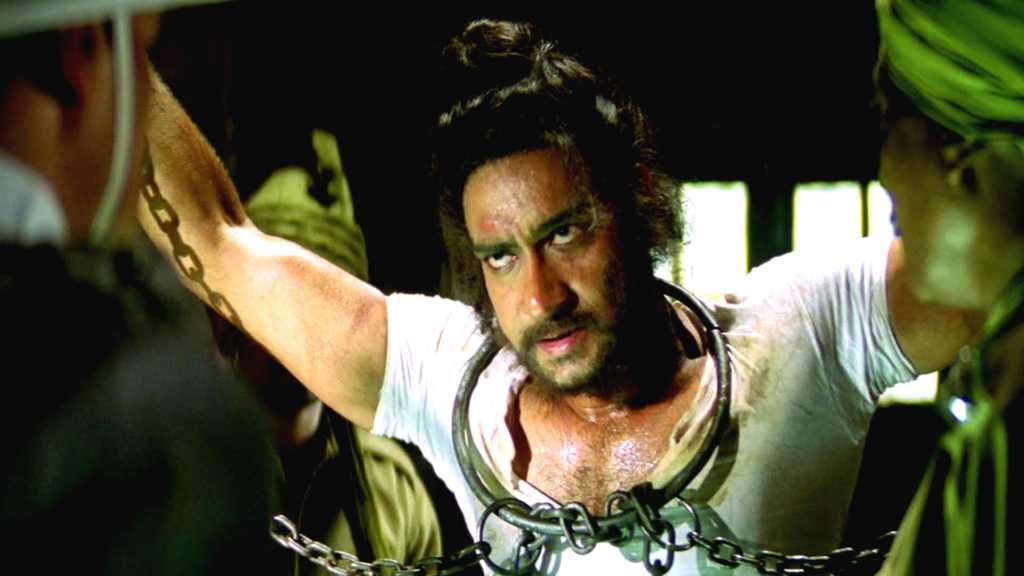7 June 2002 – This was the day when a movie was showcased on the silver screen, along with three other movies of the same genre, the same subject, and the same historical character. Yet, this one film stood out amongst all, and despite tanking at the box office [who would watch authentic Indian history on screen?], has achieved more fame than it received at the silver screen.
The movie is The Legend of Bhagat Singh, the magnum opus starring Ajay Devgn, who immortalized the charismatic young revolutionary, paying a fitting tribute to the talent of the most famous actor who essayed this role way back, i.e. Harikrishna Goswami, or whom we know better as Manoj Kumar.
Even 15 years after the release, this movie still counts for serious movie buffs, who love Indian cinema. The simple reason for the same is, this movie, is one of the very few movies, based on historical events in India, that is almost close to, if not completely accurate with reality. Yes, you might name some historic dramas like ‘Taj Mahal’, ‘Mughal e Azam’, ‘Jodhaa Akbar’, ‘Bajirao Mastani’ as the list goes ad infinitum. But ironically, none of them were even remotely close to portraying authentic history, rather the filmmakers glorified or vilified the historical greats as per the whims and fancies.
It would be quite laughable, yet heart wrenching, to see the famed Maratha general, who had defeated the Mughal Empire right in their capital, as an alcoholic, pining for only his second wife, Princess Mastani, while Shah Jahan, who had a dubious personal life, was glorified as a romantic, committed to just Mumtaz Jahan, which is strange, given that Mumtaz was her fourth wife, and he later married her younger sister after Mumtaz’s death.
Even though the Southern region of Indian cinema has fared much better, with classics like ‘The Ghazi Attack’, ‘Kaala Pani’, they are unfortunately unknown to many mainly due to linguistic barriers, which Bollywood has failed to demolish. In such a wretched league, when a film like The Legend of Bhagat Singh arrives, it proves as a soothing balm on the deep wounds that inaccurate, propaganda based historical movies by Bollywood have left on serious enthusiasts of both Indian movies and Indian history.
Directed by Rajkumar Santoshi, who had before created classics like ‘Damini’, ‘Ghayal’, ‘Ghatak’, ‘Pukar’, ‘Lajja’ etc., had once again assumed the director’s seat for The Legend of Bhagat Singh. Having acclaimed assistants like famed screenplay writer Anjum Rajabali, A R Rahman for the music, and legendary scriptwriter, lyricist, singer and actor Piyush Mishra, who had earlier written a play on the same theme, named ‘Gagan Damama Bajyo’, Rajkumar Santoshi was set to deliver an epic biopic, having also roped in Kultar Singh, the younger brother of Bhagat Singh, who was one of the last persons to have seen him alive, for authentic references, and yes, he actually did.
The movie is completely authentic, and unlike Guddu Dhanoa’s version, which looked promising with a focus on the role of Ghadar party and Lala Lajpat Rai in shaping Bhagat’s ideology, but post interval, turned into a cheap copy of Manoj Kumar’s Shaheed [1965], The Legend of Bhagat Singh fails to meander at any point. Accurate, crisp and sharp, with apt dialogues and focus on right points, The Legend of Bhagat Singh immortalized the charisma that the revolutionary had on silver screen. Apart from depicting the inhuman brutality that the British imperialists showered on us in a poignant way, Rajkumar Santoshi also depicted the turmoil within Khan Bahadur M.H. Khan, the Jail Superintendent of Lahore Central Jail, who was torn between his loyalty for the British Empire, and his growing sympathy for the young band of revolutionaries.
The movie also brilliantly portrayed the difference between the ideology of Mahatma Gandhi and the young revolutionaries. We cringe at the chance of securing the freedom of the famous trio Gandhi deliberately squanders away, by signing the atrocious Gandhi Irwin Pact. We also see the jovial side of the revolutionaries, who find humor even in the harshest of the adversities. Remember the scene, where the revolutionaries a few arrogant British bullies to run away without a fight? Who can forget the way Jatin Das forced a head constable to nurse his insides? Like Bijoy, their comrade in HSRA said, Aaj Bengali khoon jor maar gaya (Today the Bengali blood has struck hard!)
The only flaw in this movie is an unnecessary focus on the woman from Mannawali, whose proposal Bhagat had rejected in his quest for freedom. The movie also showed the hunger strikers had broken their strike on the day Jatin Da was dying, and not by 5th October, when Bhagat and Batukeshwar finally broke their fast.
It’s a matter of shame that that The Legend of Bhagat Singh was a flop, and was spurned at almost all the major award ceremonies, except for the jury prizes. However, what Ajay Devgn has done with the role is absolutely phenomenal.
Ajay Devgn literally brought Bhagat Singh to life, and for a while, we even mistook him for the real one. The other actors were equally awesome, be it Sushant Singh, or D. Santos, or even Akhilendra Mishra for that matter, in their respective roles of Sukhdev Thapar, Shivaram Hari Rajguru & Chandra Shekhar Azad.
As a fitting tribute to this classic, here is an old couplet, written possibly by famous poet cum reformer Kabir Das, and popularized by this very movie:-
“Soora Sau Pahchaniye, Jo Lade Deen Ke Het,
Purza Purza Kat Mare, Tabahun Na Chhade Khet,
Jo Dho Prem Khilan Ka Chaav, Sir Dhar Tali Gali Mori Aao”
(Remember those who fought for the poor and oppressed,
Every ounce of their body fell, yet they refused to retreat,
Who wants His Love, should walk His Lanes with heads in their hands)
